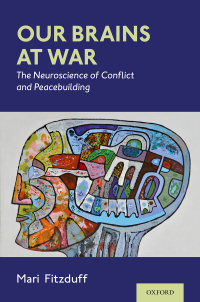Buy Our Brains at War: The Neuroscience of Conflict and Peacebuilding PDF ebook by author Mari Fitzduff – published by Oxford University Press in 2021 and save up to 80% compared to the print version of this textbook. With PDF version of this textbook, not only save you money, you can also highlight, add text, underline add post-it notes, bookmarks to pages, instantly search for the major terms or chapter titles, etc.
You can search our site for other versions of the Our Brains at War: The Neuroscience of Conflict and Peacebuilding PDF ebook. You can also search for others PDF ebooks from publisher Oxford University Press, as well as from your favorite authors. We have thousands of online textbooks and course materials (mostly in PDF) that you can download immediately after purchase.
Note: e-textBooks do not come with access codes, CDs/DVDs, workbooks, and other supplemental items.
eBook Details:
Full title: Our Brains at War: The Neuroscience of Conflict and Peacebuilding
Edition:
Copyright year: 2021
Publisher: Oxford University Press
Author: Mari Fitzduff
ISBN: 9780197512654, 9780197512678
Format: PDF
Description of Our Brains at War: The Neuroscience of Conflict and Peacebuilding:
Our Brains at War: The Neuroscience of Conflict and Peacebuilding suggests that we need a radical change in how we think about war, leadership, and politics. Most of us, political scientists included, fail to appreciate the extent to which instincts and emotions, rather than logic, factor into our societal politics and international wars. Many of our physiological and genetic tendencies, of which we are mostly unaware, can all too easily fuel our antipathy towards other groups, make us choose ‘strong’ leaders over more mindful leaders, assist recruitment for illegal militias, and facilitate even the most gentle of us to inflict violence on others. Drawing upon the latest research from emerging areas such as behavioral genetics, biopsychology, and social and cognitive neuroscience, this book identifies the sources of compelling instincts and emotions, and how we can acknowledge and better manage them so as to develop international and societal peace more effectively.





